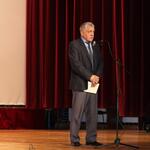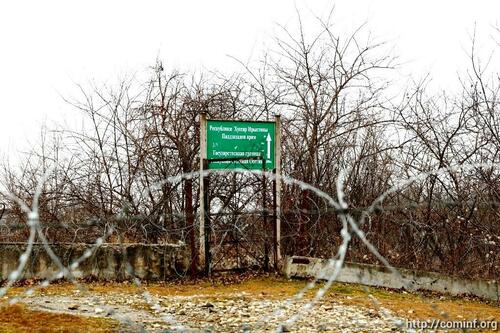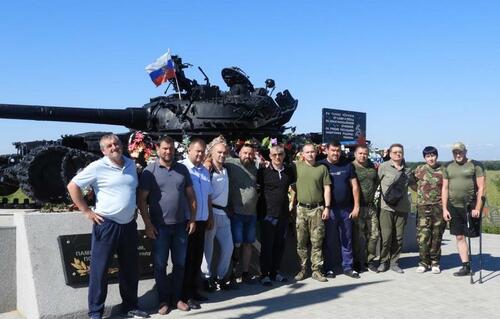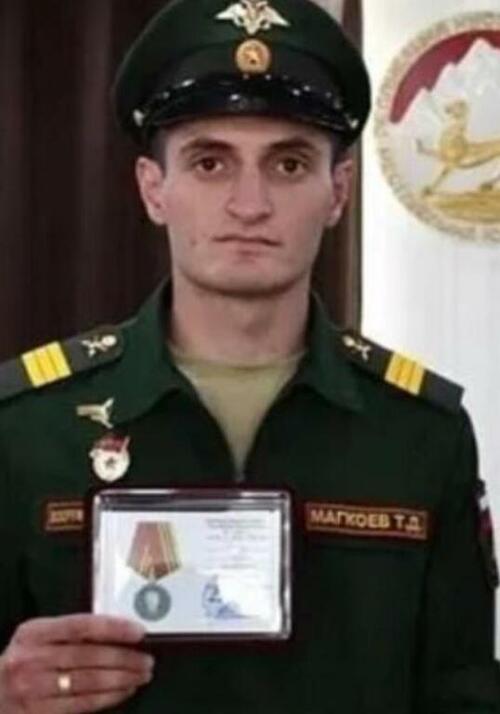On Wednesday in the capital of South Ossetia took place a memorial evening for the victims of the Armenian Genocide. The memorial event was attended by Speaker of the Republic’s Oarliament Peter Gassiev, State Adviser to the President of South Ossetia Konstantin Pukhaev, Presidential Plenipotentiary Envoy of South Ossetia for post-conflict settlement Murat Dzhioev, Adviser to the Russian Embassy in South Ossetia Sergei Manko, citizens of the Armenian nationality living in the Republic.
The participants of the event spoke about the genocide of the Armenian people, about the people who survived those terrible years. Konstantin Pukhaev expressed condolences to Armenians on behalf of President Anatoly Bibilov in connection with the 1915 genocide.
Armenian Genocide will have to be recognized sooner or later
Representative of the Armenian diaspora Ella Avagimova noted that "today, according to tradition, Turks and Azerbaijanis will hold a rally and appeal to the world community, reiterating that the Armenian Genocide is a figment of the Armenian people."
“This is the national policy of the modern Turkish Republic, which claims that the Armenian Genocide did not exist and even the word -genocide- in Turkey is banned,” she said. - You can say anything and in any way, but you can never, anywhere, get away from an indisputable historical fact. 104 years ago began the first large-scale murder of the twentieth century. The killers knew what they wanted. At first they tried to destroy the entire Armenian intelligentsia, then the ordinary people. Methodical destruction of monuments of the Armenian culture began, which, according to the new owners of the region, have been accumulated too much over three thousand years,” she said.
The representative of the diaspora has noted that the Armenian genocide will have to be recognized sooner or later, otherwise the flame of hatred will never go out.
"Hatred should go into the past, and for this it is necessary if not repentance, then at least a request for forgiveness," she stressed.
People of the "second grade"
Avagimova has stressed that in those difficult years, Armenians on their land began to be considered the “second-rate” people. “The Armenian language was banned, children were forbidden to study and attend schools, it was forbidden even to sing in Armenian. Moreover, the killing of an Armenian was not considered a crime, she said. “At the turn of the century, tensions grew between the Armenian population and the Turkish authorities, the Turkish authorities set a clear goal to completely destroy Armenian culture and the people as an ethnic group. According to historians, by the end of the 19th century, more than 80 thousand Armenians were killed in different parts of Turkey in the Ottoman Empire at that time.”
The historical roots of the friendship of Ossetia and Armenia
Murat Dzhioev thanked the Armenians living in South Ossetia for their good historical memory for the fact that “they came once again to honor the memory of their innocently murdered ancestors”.
“A person’s life is given once, and when someone takes it away by force, it’s unfair and inhuman, that’s why the massacres of Armenians were still condemned by all people of goodwill,” Dzhioyev said. - It’s not in vain that history is a good teacher, but if its lessons are not taken into account, they can repeat. We must not forget about the past.”
The Plenipotentiary has added that this year 104 years have passed since the genocide of the Armenian people, and a year later - in 2020 the Republic will celebrate the 100th anniversary of the genocide of South Ossetians with sorrow.
“Then, in 1920, a quarter of the population of South Ossetia, among them women and children, who understood little in politics, they simply wanted to live, but Georgian nonhumans took their lives. It's hard to talk about these events,” said the Plenipotentiary.
According to Murat Dzhioev, Ossetians and Armenians have a lot in common in history.
“Historical ties have intertwined so long ago that it is very difficult to share our fates,” he said.
Dzhioev jas also noted that as a historian he likes to talk about the historical ties between Armenia and Ossetia.
“When Karabakh friends come to us, I tell them each time about the Tskhinval Armenians and, moreover, with great boasting, I talk about our brother-in-law, Ganez Okopov,” he noted.
Nine Ossetian fighters awarded the title "Hero of Artsakh"
Konstantin Pukhaev, for his part, has added that the Ossetians took the most active part in the national liberation struggle of the Armenian people. “A book was recently published, and it describes the cases of Ossetian heroism in Artsakh. Nine of our fighters were awarded the titles of heroes of Artsakh,” Pukhaev noted. “They came proudly to the world by the sons of Ossetia, and fell as the great sons of the Armenian people.”
Genocide of the Armenian people is a crime that has no statute of limitations
Speaker of the South Ossetian Parliament, Peter Gassiev, has noted that the genocide of the Armenian people is a terrible crime that does not have a statute of limitations.
“I am absolutely sure that sooner or later all civilized countries will recognize the Armenian genocide,” Gassiev stressed.
Zurab Davityan, a resident of Tskhinval, shared his family story. According to him, he is a native of Tskhinval, during the genocide his great-grandfather sent his family, trying to save it, after long trials they came to Ossetia.
“For my family, everything ended well,” he said. Davityan has noted that the Armenian Genocide is a tragic page in the history of the Armenian people.
The participants of the evening also presented the film of the German director of Turkish origin Fatih Akin “The Scar”.
The film tells about his father, who survived the genocide, but lost his twin daughters and is now looking for them around the world. For many years of searching, fate throws Nazareth Manukyan into different parts of the world - from the native village of Mardin to the desert of Mesopotamia, from Cuba to North Dakota. "The Scar" was the first film about the Armenian Genocide, which was shown in Turkey. The picture received a prize at the Venice Film Festival.
History
Residents of Armenia and representatives of the Armenian Diaspora celebrate the sad date of April 24 - the 104th anniversary of the genocide in Ottoman Turkey, which killed more than 1.5 million Armenians.
By 1914, there were about 4.1 million Armenians worldwide. Of these, 2.1 million lived in the Ottoman Empire, 1.7 million in Russia, 100,000 in Persia, and 200,000 in other countries.
In 1915-1923, according to Armenian historians, about 1.5 million Armenians were destroyed in the Ottoman Empire, more than 60 Armenian cities and 2.5 thousand villages were burned and looted. About 1 million Armenians fled or were evicted by the Turks in Mesopotamia, Lebanon, Syria. “The real purpose of the deportation (of Armenians) was robbery and extermination; it really is a new method of massacre. When the Turkish authorities ordered these expulsions, they actually passed the death sentence on an entire nation,” wrote the US Ambassador to Turkey in 1913-1916.
The genocide caused the dispersion of Armenians, who today mostly live outside their historical homeland. In today's Turkey, if we do not count Istanbul, where about 50,000 Armenian communities remained, there are practically no Armenians left.
For more than 100 years, Armenian public and political organizations have been fighting in various countries of the world for the official recognition and condemnation of the 1915 Armenian genocide. In 1987, the European Parliament adopted a resolution. The genocide was first recognized in 1965 by Uruguay, then France, Italy, Holland, Belgium, Poland, Lithuania, Slovakia, Sweden, Switzerland, Greece, Cyprus, Lebanon, Canada, Venezuela, Argentina, Brazil, Chile, the Vatican, Bolivia, Czech Republic, Austria, Luxembourg.
In 1995, the State Duma of the Russian Federation adopted a decree "On the condemnation of the genocide of the Armenian people of 1915-1922 in its historic homeland - in Western Armenia."
The Armenian Genocide was also recognized by the World Council of Churches. Of the 50 US states, 44 states officially recognized and condemned the Armenian Genocide, and also declared April 24 the Day of Remembrance of the Victims of the Armenian Genocide. The issue of recognition of the Armenian Genocide in the US Congress was repeatedly raised, but so far this has not happened.
In February 2019, French President Emmanuel Macron signed a decree establishing the Day of Remembrance of the Armenian Genocide of 1915, and in April the lower house of the Italian parliament approved a resolution calling "the government to recognize the Armenian Genocide in the Ottoman Empire and give it international publicity."
The issue of recognition of the genocide is one of the main obstacles in the normalization of relations between Armenia and Turkey. In modern Turkey, the fact of mass deportation of Armenians during the First World War is not denied, however, they categorically refuse to recognize it as genocide. As a result, Yerevan and Ankara have not yet established diplomatic relations, and the 330 km-long border has been closed since 1993 on the initiative of Turkey.
The process of normalization of the Armenian-Turkish relations began on the initiative of the former President of Armenia, Serzh Sargsyan, only in the fall of 2008. On September 6, 2008, Turkish President Abdullah Gul first visited Yerevan on the invitation of Sargsyan to watch a football match between the national teams of Armenia and Turkey in the framework of the qualifying round of the 2010 World Cup. There was also a meeting of the heads of two neighboring states, which in Turkey was called a historic event. This visit was called "football diplomacy" and was widely reported in the world press. In turn, Sargsyan visited Turkey on October 14, 2009 to watch the return match between the football teams of the two countries.
Then, in October 2009, Foreign Ministers of Armenia and Turkey, Edward Nalbandian and Ahmet Davutoglu, signed in Zurich a “Protocol on the establishment of diplomatic relations” and a “Protocol on the development of bilateral relations”, which should be ratified by the parliaments of the two countries. However, on April 22, 2010, Sargsyan signed a decree on suspending the ratification process of the Armenian-Turkish protocols, stating that Turkey is not ready to continue the process started.
On March 1, 2018, Sargsyan annulled the protocols. He has stated that Armenia did everything not to leave the issue of the settlement of Armenian-Turkish relations to future generations. However, in his opinion, Ankara "did not take a single step for the ratification and entry into force of the documents."









